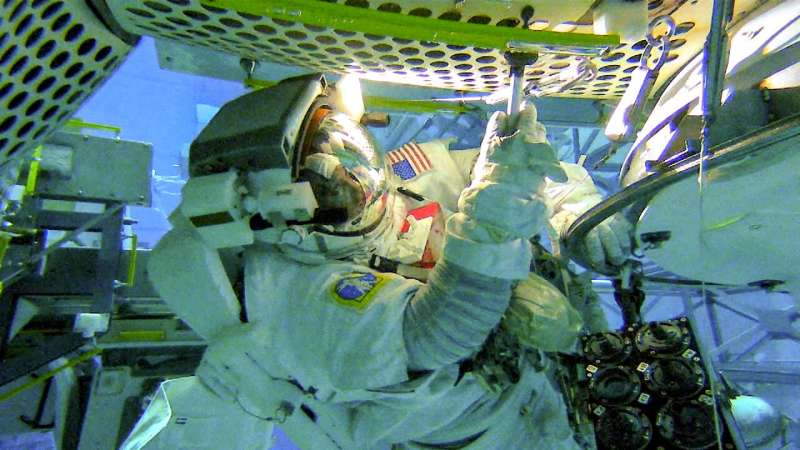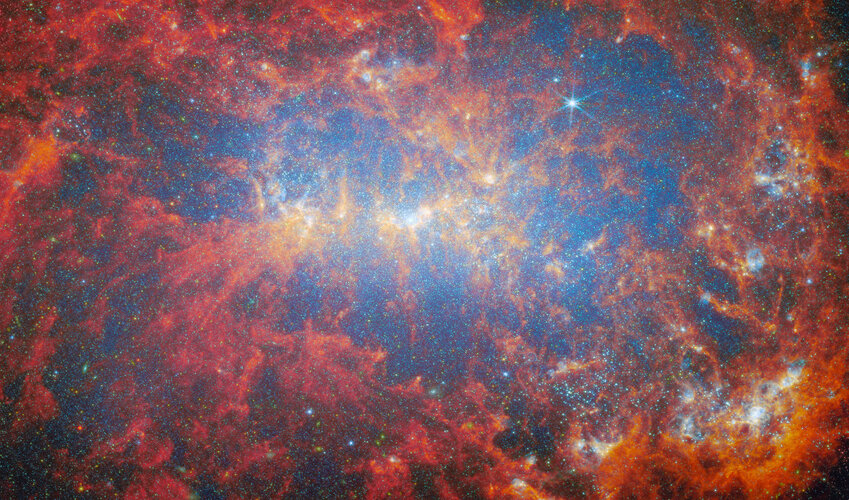
Copernical Team
ESA and NASA Evaluate Lunar I-Hab Living Conditions
 Lunar I-Hab, the next European habitat in lunar orbit as part of the Gateway, has recently undergone critical tests to explore and improve human living conditions inside the space module.
ESA and NASA astronauts collaborated with Thales Alenia Space to evaluate the ergonomics and habitability of the Lunar I-Hab module in Turin, Italy. This milestone, known as Human-in-the-Loop (HITL), is a
Lunar I-Hab, the next European habitat in lunar orbit as part of the Gateway, has recently undergone critical tests to explore and improve human living conditions inside the space module.
ESA and NASA astronauts collaborated with Thales Alenia Space to evaluate the ergonomics and habitability of the Lunar I-Hab module in Turin, Italy. This milestone, known as Human-in-the-Loop (HITL), is a NASA selects industry proposals to advance technologies for Habitable Worlds Observatory
 NASA announced Friday it selected three industry proposals to help develop technologies for future large space telescopes and plan for the agency's Habitable Worlds Observatory mission concept, which could be the first space telescope designed to search for life outside our solar system.
The mission aims to directly image Earth-like planets around stars similar to our Sun and study their a
NASA announced Friday it selected three industry proposals to help develop technologies for future large space telescopes and plan for the agency's Habitable Worlds Observatory mission concept, which could be the first space telescope designed to search for life outside our solar system.
The mission aims to directly image Earth-like planets around stars similar to our Sun and study their a NASA's Europa Clipper Arrives in Florida for Launch Preparation
 Crews rotated to vertical then lifted NASA's Europa Clipper spacecraft from its protective shipping container after it arrived at the Payload Hazardous Servicing Facility (PHSF) at the agency's Kennedy Space Center in Florida on May 28.
The spacecraft, which will collect data to help scientists determine if Jupiter's icy moon Europa could support life, arrived in a United States Air Force
Crews rotated to vertical then lifted NASA's Europa Clipper spacecraft from its protective shipping container after it arrived at the Payload Hazardous Servicing Facility (PHSF) at the agency's Kennedy Space Center in Florida on May 28.
The spacecraft, which will collect data to help scientists determine if Jupiter's icy moon Europa could support life, arrived in a United States Air Force New Study Suggests Dark Matter May Be Self-Interacting
 Recent research conducted by Riccardo Valdarnini of SISSA's Astrophysics and Cosmology group challenges the standard model by suggesting that dark matter may be self-interacting. The study, published in "Astronomy and Astrophysics" (A&A), used numerical simulations to analyze the giant cluster merger "El Gordo," located seven billion light years away. The findings indicate that the physical sepa
Recent research conducted by Riccardo Valdarnini of SISSA's Astrophysics and Cosmology group challenges the standard model by suggesting that dark matter may be self-interacting. The study, published in "Astronomy and Astrophysics" (A&A), used numerical simulations to analyze the giant cluster merger "El Gordo," located seven billion light years away. The findings indicate that the physical sepa CGI works on new interfaces for European Space Agency to expand satellite communications market
 CGI (TSX: GIB.A) (NYSE: GIB), a major provider of IT and business consulting services, has been commissioned by the European Space Agency (ESA) to develop standardized satellite communications interfaces. This project aims to optimize resource usage, open the market to more operators, and foster long-term cooperation within the European satellite communications industry. The first open-source in
CGI (TSX: GIB.A) (NYSE: GIB), a major provider of IT and business consulting services, has been commissioned by the European Space Agency (ESA) to develop standardized satellite communications interfaces. This project aims to optimize resource usage, open the market to more operators, and foster long-term cooperation within the European satellite communications industry. The first open-source in Boeing will try to launch its first crew on Starliner, again
 Troubled aerospace giant Boeing will try once more to fly its first crew to the International Space Station aboard a Starliner spaceship on Saturday, after the last attempt was scrubbed hours before liftoff.
Following checks by engineering teams, NASA astronauts Butch Wilmore and Suni Williams are "go" for launch atop a United Launch Alliance rocket at 12:25 pm (1625 GMT) from the Cape Canav
Troubled aerospace giant Boeing will try once more to fly its first crew to the International Space Station aboard a Starliner spaceship on Saturday, after the last attempt was scrubbed hours before liftoff.
Following checks by engineering teams, NASA astronauts Butch Wilmore and Suni Williams are "go" for launch atop a United Launch Alliance rocket at 12:25 pm (1625 GMT) from the Cape Canav Space station research advances NASA's plans to explore the moon, Mars

Space, the saying goes, is hard. And the farther humans go, the harder it can get.
Some of the challenges on missions to explore the moon and Mars include preventing microbial contamination of these destinations, navigating there safely, protecting crew members and hardware from radiation, and maintaining and repairing equipment.
Research on the International Space Station is helping NASA scientists develop tools and processes to ensure success on these important missions. Here are highlights from some of the investigations making space a little easier.
Tracking tiny stowaways
Bacteria and fungi live in and on all humans and all around us on Earth. Most of these microorganisms are beneficial or harmless but introducing them to other celestial bodies could adversely affect our ability to study ecosystems on those other worlds.
Week in images: 27-31 May 2024

Week in images: 27-31 May 2024
Discover our week through the lens
Slovakia, Peru sign NASA's Artemis Accords on safe space exploration
 Slovakia and Peru on Thursday signed NASA's Artemis Accords, making them the latest in a rapid number of countries to join the U.S.-led agreement on the safe exploration of space.
Both countries signed the accords at NASA's Washington headquarters, but in separate ceremonies with Peru the first to add its name to the accords on Thursday followed by Slovakia, making them the 41st and 42n
Slovakia and Peru on Thursday signed NASA's Artemis Accords, making them the latest in a rapid number of countries to join the U.S.-led agreement on the safe exploration of space.
Both countries signed the accords at NASA's Washington headquarters, but in separate ceremonies with Peru the first to add its name to the accords on Thursday followed by Slovakia, making them the 41st and 42n Twin NASA Satellites to Measure Earth's Polar Energy Emissions
 NASA has launched the first of two shoebox-size CubeSats to help scientists understand the behavior of clouds and water vapor at Earth's polar regions and their impact on climate. The first satellite of the Polar Radiant Energy in the Far-InfraRed Experiment (PREFIRE) mission was launched from New Zealand on May 25. The second CubeSat is scheduled to launch on June 1.
The PREFIRE mission w
NASA has launched the first of two shoebox-size CubeSats to help scientists understand the behavior of clouds and water vapor at Earth's polar regions and their impact on climate. The first satellite of the Polar Radiant Energy in the Far-InfraRed Experiment (PREFIRE) mission was launched from New Zealand on May 25. The second CubeSat is scheduled to launch on June 1.
The PREFIRE mission w 
